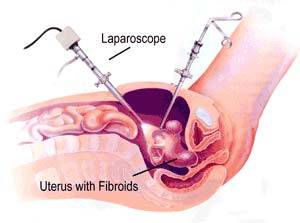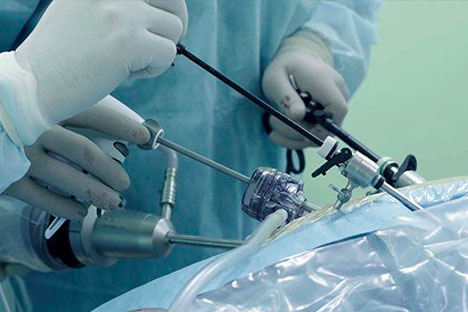Hysterectomy
 Hysterectomy is a ob gyn surgical procedure that’s employed to remove the uterus (womb). This has become a very common procedure in the US and is done for a multitude of reasons, one of the most common being abnormal bleeding or fibroids.
Hysterectomy is a ob gyn surgical procedure that’s employed to remove the uterus (womb). This has become a very common procedure in the US and is done for a multitude of reasons, one of the most common being abnormal bleeding or fibroids.
A hysterectomy is the removal of your uterus, which can also be combined with removing your fallopian tubes, ovaries, and cervix, based on your specific situation. After removing the uterus, it is impossible to conceive.
Why You May Need the Procedures
Hysterectomy is one of the most common surgeries performed on women in the US
If you are young enough and would like to have more children (or even your first child), then it’s usually recommended that you undergo a myomectomy first to try to relieve your symptoms. In a myomectomy, the uterus is actually left intact and attempts are made to only remove the fibroids (myomas or muscular growths). Hysterectomies and myomectomies are discussed for several of the following reasons:
- Chronic constipation
- Heavier than normal menstrual cycles
- Bleeding during your periods that lasts longer than a week
- Pelvic pain or pressure
- Leg pain or backaches
- Urinating more frequently
- Difficulty starting a urine stream
On the other hand, a hysterectomy may be the best form of treatment for more serious conditions, such as:
- Cancer, including ovarian, cervical or endometrial
- Uterine prolapse, when your uterus falls out of place
- Adenomyosis, when endometrial tissue moves outside of your uterus
- Severe endometriosis that hasn’t responded to other treatments
- Uncontrolled bleeding while giving birth
- Chronic pelvic pain
- Vaginal bleeding that continues despite various treatments
- Fibroids that are too large and have irreparable changed the structure of the uterus
All symptoms should always be evaluated with a thorough consultation and examination by your NYC gynecologist for an accurate diagnosis and treatment plan to exclude any underlying serious condition.
Hysterectomy is the second most common surgery performed in the U.S., accounting for about half a million surgeries per year. Depending on your age, severity of your symptoms and future lifestyle plans, you and your ob gyn in NYC can decide which hysterectomy option is best for you. Some options are:
- A radical hysterectomy removes all of your reproductive organs. It’s usually performed when you’ve been diagnosed with cervical or endometrial cancer.
- During a partial hysterectomy, only your uterus is taken out. A laparoscopic myomectomy may be performed on the rest of your organs to remove fibroids.
- A total or simple hysterectomy removes just your uterus and cervix. It’s ideal for women with fibroids who don’t want to lose their ovaries.
- Laparoscopic or robot assisted laparoscopic hysterectomy is the most minimally invasive procedure.
Hysterectomy Procedure and Risks

There are a number of avenues your surgeon may take to perform your hysterectomy, depending on your goals, as well as your gynecologist’s preferences. Removing your reproductive organs may be done by:
- A cut made surgically in your vagina
- Three or four smaller incisions made through your belly, usually reserved for robotic hysterectomy
- A larger cut made in your abdomen
- Smaller cuts around your navel for laparoscopic removal
In addition to the normal risks associated with any surgical procedure, hysterectomy complications can include:
- Sex after hysterectomy can be painful
- Bladder or ureter injuries
- A loss of sexual interest or appetite
- Menopausal symptoms if your ovaries were removed
- Higher risk of heart disease if your ovaries are removed before natural menopause
Hysterectomy Recovery
After an abdominal or vaginal hysterectomy, you’ll be encouraged to get up and walk as soon as you wake from the anesthesia. After one or two days in the hospital, you’re sent home to monitor yourself for pain and excessive bleeding. You’ll leave with medication to prevent infection and relieve your pain. Expect to be back to normal in about four to six weeks.
Hysterectomies can now be done with the assistance of a robot which can make many hysterectomies outpatient procedures
Following a laparoscopic hysterectomy, you can expect many of the same side effects, but your recovery time is much quicker, typically from one to two weeks.
One of the most glaring differences between an abdominal (the most common) and a laparoscopic (the least invasive) hysterectomy is the scarring you’re left with. Laparoscopic hysterectomy scars are virtually non-existent. The tiny incisions heal quickly and leave no visible reminders. The abdominal hysterectomy scar heals, but is bigger. Your surgeon places it so that it falls in natural folds on your belly, but you most likely will have a visible scar.
All symptoms should always be evaluated with a thorough consultation and examination by your gynecologist for an accurate diagnosis and treatment plan to exclude any underlying serious condition. Laparascopic myomectomy/hysterectomy, indications, options, risks/benefits should always be discussed with your gynecologist.
Important Reminder: This information is only intended to provide guidance, not definitive medical advice. Please consult ob/gyn doctor about your specific condition. Only a trained, experienced gynecologist can determine an accurate diagnosis and proper treatment.
Have questions about Laparoscopic Myomectomy/Hysterectomy procedure? Schedule an appointment with recognized OB GYN doctor, Dr. Fernando Mariz of Manhattan Women’s Health and Wellness, today.
Updated on Jun 26, 2020 by Dr. Fernando Mariz (Gynecologist), Manhattan Women’s Health and Wellness
Best-in-class
New York Gynecology Clinic
Manhattan Specialty Care in the Press

Call now to make an appointment with our highly rated Manhattan Gynecology doctors regarding your health. We look forward to seeing you!
book online now
(212) 378-9987
New York City Locations:
Manhattan Women's Health & Wellness (Upper East Side)
983 Park Ave, Ste 1D17
New York, NY 10028
(212) 389-1904
Manhattan Women's Health & Wellness (Midtown)
51 East 25th St, Ste 451
New York, NY 10010
(212) 677-7654
Manhattan Women's Health & Wellness (Union Square)
55 W 17th St, Ste 104
New York, NY 10011
(212) 378-9985